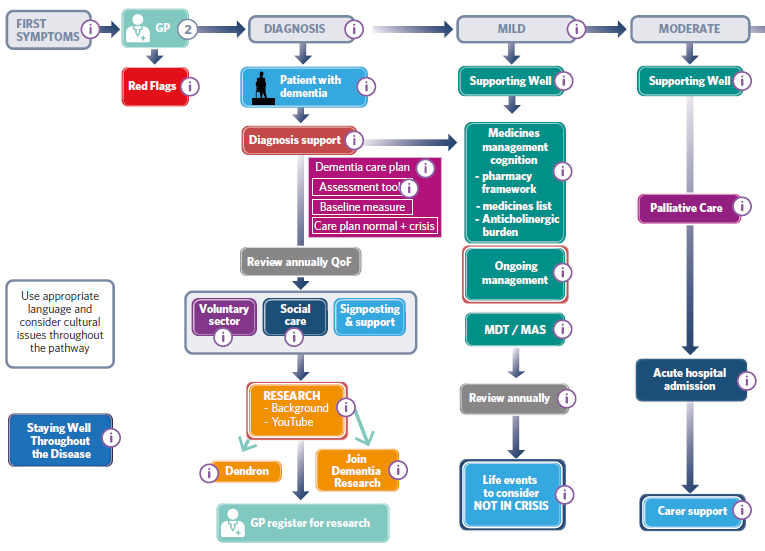

Sarah Gillett is Managing Director of the Neurology Academy.
Correspondence to:
Email: sarahgillett@neurologyacademy.org
Interactive pathway toolkit provides a one-stop shop resource for professionals working in dementia care
Following a partnership between academia, the NHS and the third sector, clinicians can now access a free toolkit containing a comprehensive roadmap and resources for the care of people with dementia.
The Dementia interactive care pathway toolkit maps out the care pathway a dementia patient will follow and provides an aide-memoire for the services and support needed from diagnosis to end-of-life care.
The toolkit’s invaluable compendium of resources can be accessed via an interactive PDF which enables clinicians to easily navigate the different elements of the care pathway and access relevant documents and further information all in one place.
It helps all professionals involved in the care of people with dementia, including commissioners, to plan services, and has a particular focus on supporting patients to stay well in order to promote independence and avoid crisis.
The toolkit is the brainchild of Dementia Academy Faculty members Dr Iracema Leroi, Sue Thomas and Dr Tony Burch who worked in partnership with the University of Manchester and Greater Manchester and Eastern Cheshire Strategic Clinical Network (SCN), and with support from Wilmington Healthcare. A range of stakeholders – including people with dementia, their carers, medical professionals, police and ambulance personnel, social workers and commissioners, were also involved in the creation of the toolkit. Consequently, it reflects firsthand experiences of the challenges involved in dementia care.

Sarah Gillett, Managing Director of the Dementia Academy said:
Patients with dementia have complex needs which can be best supported when a true synergy is achieved across the different health and social care disciplines.
The toolkit is a powerful resource for supporting health professionals across the country to deliver a best practice dementia care service. We hope that it will enhance the dedicated efforts of the many people looking after people with dementia in England.
Dr Iracema Leroi, who is a Faculty member at the Dementia Academy, and Clinical Senior Lecturer Honorary Consultant in Psychiatry, University of Manchester, Manchester Mental Health and Social Care Trust Institute of Brain, Behaviour and Mental Health, said:
This pathway is a wonderful new tool to help frontline professionals support people with dementia and their carers. It’s a veritable ‘Aladdin’s cave’ of interesting bits of information and guidance about the multitude of problems which people with dementia may face.
“We intend the tool to be dynamic and flexible so that anyone using it can adapt it to their own local circumstances and update it as new evidence about better care becomes available. It can be stored on a desktop for ‘quick reference ‘ and each component can be studied in more depth as required. We are sure that it will become an invaluable part of daily practice to support people with dementia.
Faculty member Dr Tony Burch, who is a GP in NHS Brent Clinical Commissioning Group said:
There is currently huge interest in and awareness of dementia. In the last year, NHS England has focused on ensuring that two thirds of the estimated number of people with dementia will have a formal diagnosis and post diagnostic support.
To help achieve this, NHS England wants to facilitate information so GPs can feel safe about diagnosing dementia in particular clinical situations. There is a need to empower GPs to be able to make a diagnosis if they think that is clinically justified and appropriate. The new toolkit is a vital instrument to ensure GPs have the skills and confidence to do this.
The toolkit was created in partnership with the then Greater Manchester, Lancashire and South Cumbria SCN, which from April 2016 became Greater Manchester and Eastern Cheshire SCN. The SCN, which worked in particular to map the Dementia Well Pathway framework and develop accompanying best practice resources with the input of a plethora of experts, will now be promoting the toolkit across the Greater Manchester and Eastern Cheshire area.
Dementia Academy Faculty member Sue Thomas, who facilitated the creation of the toolkit through her role as CEO of Commissioning Excellence services at Wilmington Healthcare, added:
We have been delighted to facilitate the development and publication of this toolkit which adds to the wide range of integrated care pathways that are available currently.
The Dementia interactive care pathway toolkit is available to download at:
The toolkit will be checked annually for updates (or if major changes occur to policy).
For more information about the Dementia Academy visit www.dementiaacademy.co
